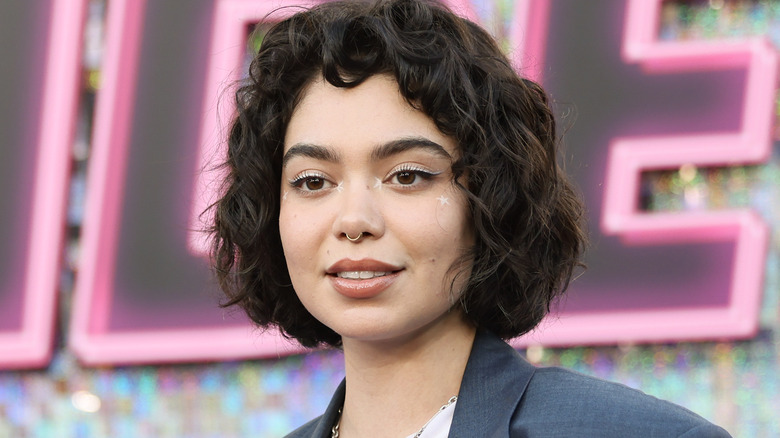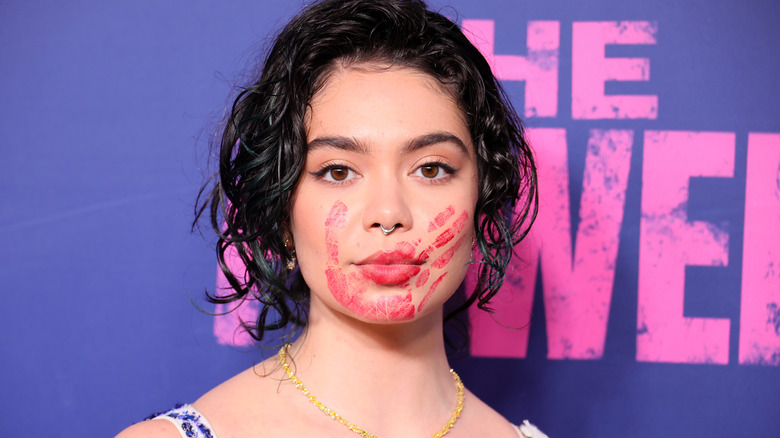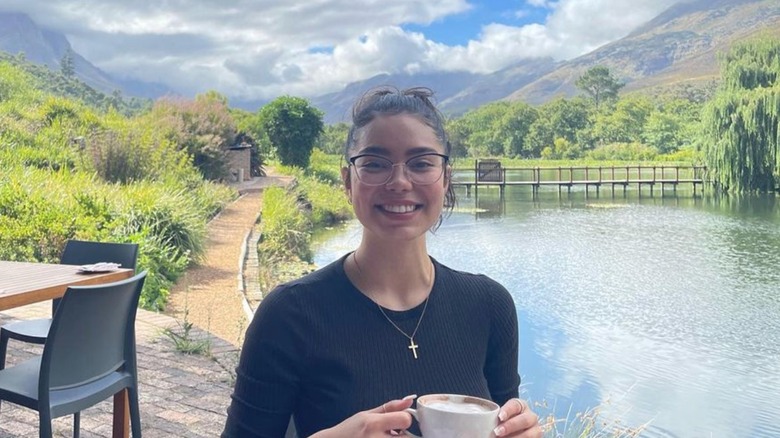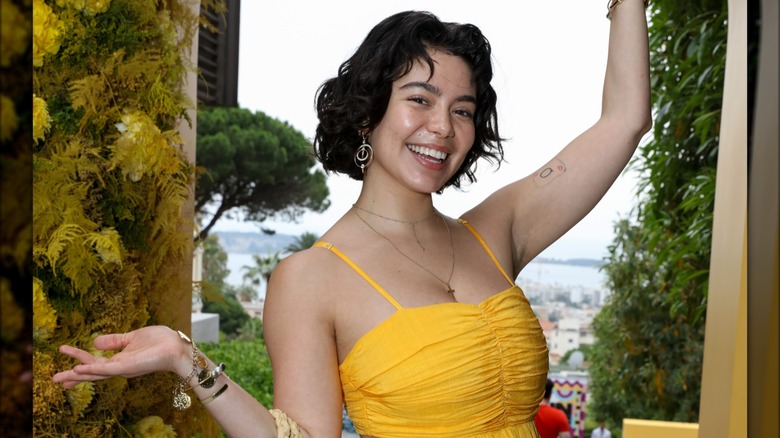What Auli'i Cravalho Wished You Knew Before Taking Your Hawaii Vacation - Exclusive Interview
Auli'i Cravalho became a household name for her stunning vocal performance in Disney's 2016 film "Moana." Cast when she was just 14 years old and had no professional acting credits to her name, Cravalho hasn't missed a beat since landing this career-making role. She's booked major voiceover, singing, and acting projects, like playing Janis Ian in the upcoming film version of Broadway's "Mean Girls" musical. Adding even more skills to her growing resume, the star will also be an executive producer on the live-action remake of "Moana."
Since moving from her home in Hawaii to Los Angeles, Cravalho has also been busy carving out her identity as a Gen Z change-maker. Teaming up with the brand SHEBA, Cravalho is supporting its Hope Grows project focused on coral reef restoration around the globe. Since 2019, the initiative has worked to restore Hope Reef on Salisi' Besar in Indonesia, and it's now expanding the mission to Hawaii's reef systems, collaborating with the local organization Kuleana Coral Restoration.
As a native Hawaiian, Cravalho is eager to protect environmental fixtures like coral reefs, which have a major impact on the biodiversity of the ocean, livelihoods around the globe, and brands like SHEBA, which rely on sustainably-sourced fish to produce their products. Her exclusive interview with Explore somehow makes us love Auli'i Cravalho even more, as she gets into the truth about reef-safe sunscreens, how we can help protect the world's oceans, and why her partnership with SHEBA is meaningful on multiple levels.
The star is an actress and activist
You've been super vocal about political and environmental issues, and now you're partnering with SHEBA and working to protect the coral reefs. Were you always aware of how precious the reefs were because you grew up in Hawaii or was that something you've learned more about recently?
Yeah, I'd say so. I was really lucky. I attended Kamehameha schools, which is an all-Hawaiian school, so I've always understood not only the impact of the coral reefs for food production, but also the cultural and spiritual significance that our ocean has. I was born and raised in Hawaii, and I've been able to see first hand as well as through stories of my mom and her mom. My family has lived in Hawaii for generations. We can trace our lineage back to the kings and queens.
I've been able to not only see but hear about how climate change has affected our oceans and everything, as we are a little island in the middle of the sea. Rising sea levels is one of them, [along with] ocean acidification, which harms our fish, and then the rising temperatures causing major coral bleaching. I've always been passionate about this. I grew up swimming and surfing and snorkeling, and as I live in Los Angeles, I always try to find ways to give back to my community at home, which feeds my heart.
For anyone visiting Hawaii, what level of awareness or education would you recommend before exploring its natural resources?
I think people forget — and I also have sometimes a tendency to do this as a young person inheriting a world on fire — that there are some really simple things that we can do to make a difference. One is be mindful that coral is a living creature, and that touching or stepping on it can harm or even kill it. If you're lucky enough to be around coral, then be aware of the products that you're using on your skin. It's so important to protect yourself from the sun, but as we all know from reapplying sunscreen, that washes off in the water after a period of time. Something to note is that Hawaii has banned oxybenzone and octinoxate, which is a fancy way of saying that there are chemicals in sunscreen that are toxic to not only the reefs, but also to us.
A solution to that would be using a mineral-based and more reef-safe sunscreen, and at the very least, please pick up after yourself when you go to the beach and pick up after others. Everything truly does lead to the ocean. A wrapper, as we've all heard, can look like food to either fish or turtles. Also, a lot of people forget that microplastics are everywhere on our beaches, and we want to do our very best to leave the world ... to leave our space better than how we found it and, hopefully, foster a future with more coral and, therefore, more fish.
Coral reef restoration is a cause close to her heart
SHEBA, which most people know for the cat food brand, has launched the biggest coral reef restoration program ever, and they helped increase the coral reef cover in Hope Reef in Indonesia from 2% to 70%. How can we support their efforts? What's most exciting to you about what they're doing?
I'm really excited because as I mentioned, SHEBA brand is partnering with Kuleana Coral Reefs. We have now joined SHEBA's Hope Grows program. They have 30 restoration sites in 10 countries across five continents, and as you said, we have been seeing such incredible growth. It is so important that we give homes back to fish. We've destroyed their natural habitats. I'm really grateful that SHEBA has worked with [Kuleana Coral Reefs] on the ground and asked them, "Hey, what do you need?" Instead of coming in with their own techniques of, "I think this would be best."
Kuleana Coral Reefs has been working on this for a few years now, and it was so sweet. I got to meet them not too long ago. Truly, these are firefighters. They are firefighters in their day jobs, and then in their free time, they were hoping to preserve the island that they love, that they've grown up on. It's a great motivator for us to remember that native communities and local communities depend on the ocean. My mom, like I mentioned, she grew up on the water. She's the seventh child of seven children, so when they would camp at the beach, they would live off the land. It is so important that we remember that this is a global issue, and I'm glad that SHEBA brand is thinking on that global scale.
From the fish to their cat food, all organisms are going to affect each other eventually. I know SHEBA has a sustainable beach bag bundle. Do you have a favorite item?
I have to say that the water bottle is pretty fire. I'm using it right now, because I used to have this water bottle that was rubbery on top and I would take it to the beach and then sand would get stuck on my water bottle. This one is currently my favorite. It keeps my water nice and cold, and it is important to say that if you can't do anything else, pack out your trash and also try to make switches to reusable items to reduce waste in the first place.
I like that it has the little cat on it. Are you a cat person? Is that why SHEBA's a great connection?
I'm a pet parent. My cat Rocco is currently ignoring me, and that's perfectly fine. That's exactly his role in my life. I adopted Rocco in 2019. He was a feral cat that a friend of mine found under her house, and I have loved him ever since. He's lasted longer than a couple of boyfriends, so he's here to stay. I love him dearly.
Auli'i Cravalho may have a future in environmental work
If you could have a dream location for advocacy work for the environment and conservation, where would you want to go?
If we're talking about conservation work, I got to attend the TED Countdown conference, which was not too long ago in Detroit, Michigan. I got really inspired, and I've always been a big fan of following my favorite climate activists on social media. When I think of the climate crisis conversation, there are so many different areas that people can find themselves in. There are still so many gaps as well. When we think of fashion, we can think of how to reduce waste in that area. We can think of how to cherish the items that we have and repair what we have and only buy things that we really are going to love. Growing up in Hawaii, I also think of the climate crisis affecting native communities. I think of us losing land in general, losing our beaches, but also that means that the island is getting smaller.
It's already so expensive to buy property there. I don't live in Hawaii. It is simply too expensive for me, and that is saying something. If I could go anywhere, I would go back home. There's still so much to be done. I would love to advocate for native Hawaiians in getting our land back and removing the blood quantum that is required for Hawaiian homelands and then continue working in the ocean space. We have this division called "Ahupua'a," which means basically from Mauka to Makai, from mountain to the sea. That was how people found their identity and their location. When I would introduce myself in Hawaiian, I would say, "My name is Auli'i. I'm from this Ahupua'a and this wind," because there are different winds within that Ahupua'a.
When I think of how best to start these conversations, I have to think of it from a holistic way of, "How is the runoff affecting our oceans, how can we really plant our own food and use the runoff wisely, and how can we work with communities there on the ground?"
I hope to go home soon. I hope to also attend college and get into this environmental work, whether that be on the science side, but I hope more on the societal impact side. There's a lot of work to be done in this area, but like I said, this really does, I hope you can tell, fuel my soul. I'm grateful to be partnering with SHEBA brand and Kuleana Coral Reefs because it opens these doors even wider for more work done by myself, but also, I hope the community that hears about it.
The actress is ready to share her story
You wrote a letter to your future self for Net-a-Porter a couple of months ago, and you talk about wanting to write your own story. Do you see yourself writing your own story about the causes you care about, and do you think your future self will be grateful for the sustainability work you're doing right now?
Thank you for reading that. I found that process to be therapeutic and figuring out whether I was actually paying attention to the incredible opportunities, but also the very fast pace that I live in. I feel like I am writing my own unique story. I grew up in Hawaii. I am a proud Kanaka Maoli. I'm a Native Islander. I'm also a mixed kid living in Los Angeles, who everyone calls racially ambiguous. I have a lot of thoughts. I have a lot of hopes, a lot of dreams, and a very unique voice. I hope that, whether it be Gen Z, my beautiful generation that is inheriting a world on fire, or the previous generations before us, I hope to inspire them and implement change by being the change. Thank you for reading that. Thank you for seeing me.
Learn about SHEBA's Hope Grows project and collaboration with Kuleana Coral Restoration.
This interview has been edited for clarity.



